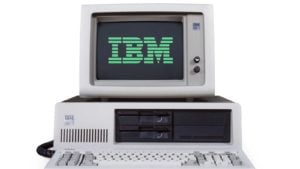The worst curse you can lay on any stock today is to call it “value.”
Value, especially as it pertains to sharing earnings with investors in the form of dividends, has become pure foolishness, particularly in the tech industry. If they’re handing out cash, investors suspect, management must not have anything better to do with my money.
Exhibit A is International Business Machines (NYSE:IBM), which has steadily lost one-third of its value over the last decade while more than doubling its dividend from about 71 cents to $1.56. It continued to lose ground November 10, while spinning out its service unit as Kyndryl Holdings (NYSE:KD).
No Value, Thanks
Kyndryl, despite its headquarters atop One Vanderbilt Place, the new skyscraper next to Grand Central Station, has lost one-quarter of its value in barely a week. It opened November 11 with a market cap of under $5 billion on expected 2021 sales of $19 billion. IBM itself is now worth $108 billion on expected sales of $74 billion.
IBM, which dominated computing when I first joined the tech beat, is now an industry minnow. Microsoft (NASDAQ:MSFT), practically a startup when I began my journalism career, is now worth nearly $2.5 trillion. Any of the five “Cloud Czars”—Microsoft, Apple (NASDAQ:AAPL), Alphabet (NASDAQ:GOOGL), Amazon.Com (NASDAQ:AMZN) or even Meta Platforms (NASDAQ:FB)—could buy IBM with the equivalent of pocket change.
Yet less than a decade ago IBM seemed poised to be among those Cloud Czars. That was when it acquired SoftLayer, then “the world’s largest privately held cloud computing infrastructure provider.” Since then, it has also bought Red Hat, a leading provider of cloud software. Nothing has helped.
The reason? While IBM had the cash flow to sustain cloud investment, it prioritized buybacks and dividends under former CEO, now executive chairman, Virginia Rometty. The company paid out nearly $5.8 billion in dividends in 2020 and put just $3.2 billion into capital expenditures.
Brain Drain
The result is that, while Red Hat is being marketed as the company’s growth engine, it’s being forced to hire junior programmers for senior positions. While Rometty continues to be lauded as a business leader, the company she ran is circling the drain.
Under current IBM CEO Arvind Krishna, IBM has more employees in India than in the U.S., and every move it makes comes with financial pain. Krishna said the Kyndryl spin-off caused a “pause” in client spending. While the rest of tech is in growth mode, IBM revenue for the September quarter was flat, and cloud revenue was up just 14%. IBM’s brain trust has been systematically decapitated. Whether it wins or loses the resulting age discrimination lawsuit is irrelevant.
Instead of addressing its weaknesses, IBM just reshuffles the deck chairs on this Titanic. Its Global Business Services unit is now called IBM Consulting. It keeps claiming “ambitious, long-term strategies” and reporters keep calling it a “tech giant,” but the fact is it’s irrelevant.
The Bottom Line on IBM Stock
IBM is now the Grey Gardens of the computing industry. It’s a huge technology mansion, filled with empty rooms. It’s a huge bureaucracy, pretending at being what it’s most definitely not, a major technology player.
There are still analysts predicting great things for IBM. The average one-year price target at Tipranks is 30% above where it’s now trading. But this is a stock that’s up just 6.65% in a year where the average stock in the S&P 500 is up 32%. It’s down 8% in the last two years, 22% in the last five years, even as the tech sector has come to dominate the world economy.
If there’s a Mt. Rushmore for short-sighted management, Virginia Rometty is its George Washington.
On the date of publication, Dana Blankenhorn held long positions in MSFT, AAPL and AMZN. The opinions expressed in this article are those of the writer, subject to the InvestorPlace.com Publishing Guidelines.
Dana Blankenhorn has been a financial and technology journalist since 1978. Just in time for the holidays he has a collection of COVID-19 stories https://www.amazon.com/Bridget-OFlynn-Virus-COVID-19-Pandemic-ebook/dp/B09K8PSQC8/ at the Amazon Kindle store. Write him at danablankenhorn@gmail.com or tweet him at @danablankenhorn. He writes a Substack newsletter, Facing the Future, which covers technology, markets, and politics.
